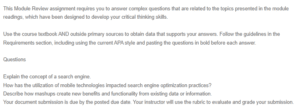Discussion – Search Engine
A search engine is a web-based software program designed to aid users in searching for information on the web using the internet (Gao & Shah, 2020). Users type the information they wish to find in the search engine, and the search engine, in turn, gives feedback on the filtered information. The search engine has the functionality to search for a webpage or information and returns results classified by how close the content matches the keyword or searched content (Gao & Shah, 2020). The most popular search engines are Google and Bing.
Search Engine Optimization through Mobile Technologies
Companies and organizations customize the search engine to ensure that their web pages and information appear close to particular searches. The process is referred to as search engine optimization, which can be implemented in mobile technology. Search engine optimization ensures that the webpage of information about a company appears relevant in the search results (Nyagadza, 2021). The optimization of mobile search engines also improves their usage, access, and visibility. In addition, the search engine needs to ensure that the content maintains a good layout, size, and visibility when it is transformed from desktop to mobile view.
Mashups and their Benefits
A mashup refers to web-based content acquired from merging and mixing information from various sources through an application or algorithm (Kast et al., 2020). Mashups’ objective is to give users easy access to information and present information in an easy interface. An example of a mashup tool is the trends map, which combines a company’s or organization’s information with location details, for example, to predict the type of clothes that can be sold in a particular place for a fashion app. Mashups enhance structuring data by mixing and merging interrelated data (Kast et al., 2020).
References
Gao, R., & Shah, C. (2020). Toward creating a fairer ranking in search engine results. Information Processing & Management, 57(1), 102138.
Kast, A., Korkan, E., Käbisch, S., & Steinhorst, S. (2020). Web of things system description for representation of mashups. In 2020 International Conference on Omni-layer Intelligent Systems (COINS) (pp. 1-8). IEEE.
Nyagadza, B. (2021). Search engine marketing and social media marketing predictive trends. Journal of Digital Media & Policy.
ORDER A PLAGIARISM-FREE PAPER HERE
We’ll write everything from scratch
Question
This Module Review assignment requires you to answer complex questions that are related to the topics presented in the module readings, which have been designed to develop your critical thinking skills.

Discussion – Search Engine
Use the course textbook AND outside primary sources to obtain data that supports your answers. Follow the guidelines in the Requirements section, including using the current APA style and pasting the questions in bold before each answer.
Questions
Explain the concept of a search engine.
How has the utilization of mobile technologies impacted search engine optimization practices?
Describe how mashups create new benefits and functionality from existing data or information.
Your document submission is due by the posted due date. Your instructor will use the rubric to evaluate and grade your submission.

